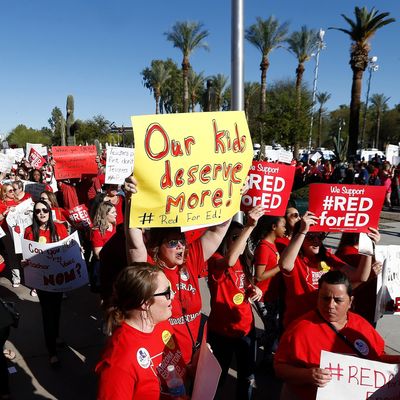
Spurning a pay raise offer from Governor Doug Ducey as too narrow and inadequately funded, Arizona teachers voted to walk off the job on April 26. Of the 57,000 teachers and school employees who participated in a vote organized by the NEA affiliate (the Arizona Education Association) and the grassroots group Arizona Educators United, 78 percent voted to strike.
The planned action is the culmination of weeks of protests by teachers (under the rubric “#RedforEd,” as supporters were urged to wear red to show solidarity) who decried low pay and years of tax-cut-driven education funding cuts. As in states where earlier teacher protests and walkouts have occurred (West Virginia, Kentucky, and Oklahoma), the Arizona action is a direct response to the fiscal policies Republicans have pursued in states they firmly control.
Ducey tried to forestall a strike last week by proposing to meet one of the protesters’ chief complaints via a 20 percent teacher pay raise implemented in phases between now and 2020. But he did not identify a revenue source for the plan, and did not address additional demands for pay raises for school support staff and restoration of past education funding cuts. Two education advocacy groups that originally expressed support for Ducey’s plan withdrew it once it became obvious the money wasn’t there to make it feasible.
The delayed strike date was intended to make it possible for school districts and parents to plan for school shutdowns. But it might also produce a window for additional negotiations. Teachers are planning daily protests at the state capitol in the lead-up to the strike.
Still, an extended shutdown seems possible. Some conservatives were never onboard with Ducey’s offer. One of the teachers’ demands, a moratorium on future tax cuts until education spending has reached the national average, is sure to rile many Republicans.
Another factor is that the strike could expose teachers to serious repercussions. Under Arizona law, school districts choosing to play hardball could deem strikers as having canceled their employment contracts, and could also seek to revoke their teaching certificates. Since this is the first statewide teachers’ strike Arizona has experienced, this is somewhat unknown territory.
Whether the strike ends in relative success, as happened in West Virginia and Oklahoma, or simply produces the kind of simmering standoff between teachers and pols we’ve seen in Kentucky, #RedforEd is almost certain to spill over into the midterm election season. Arizona’s House Democrats have already endorsed the strike as “brave and righteous.” Even if the immediate dispute is resolved, the teachers’ broader demands directly conflict with GOP priorities.
And lurking in the background is a separate dispute over a radical expansion in school vouchers that Ducey is backing, which is being challenged by a ballot initiative in November.
As the spring of discontent among red-state teachers this year continues, it could contribute to an Indian summer of red-hot political turbulence this fall.






























